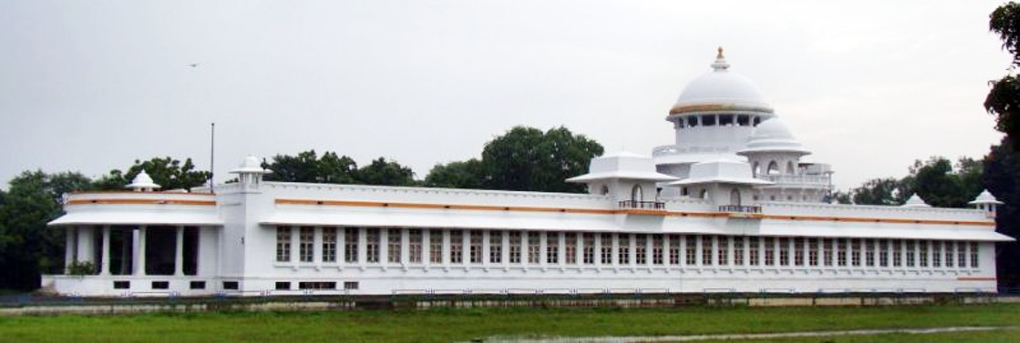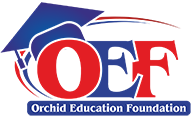
Shree Gulabkunverba Ayurved College is a torch bearing institute so far as the emitting of the rays of Ayu knowledge is concerned in Gujarat. 1946 that the foundation of this college was laid by patronage from the then Royal family Maharaja Shri Digvijaysinhji and Maharani Shree Gulabkunverba along with the painstaking efforts of Dr. P. M. Mehta and other luminaries of that period. A monumental architectural structure named Dhanvantari Mandir came into being on the cost of lacks of rupees of that time, including the donation of huge landscape and a sum of Rs. 10 lacs from the Royal family as well as a generous donation of Rs. 3 lacs by Sheth Shree Chatrabhuj Gordhandas. It has till date maintained its charm as a site worth seeing at Jamnagar and a place attracting Ayurved lovers all over the globe. H. H. Shree Maharaja Digvijaysinhji inaugurated Shree Gulabkunverba Ayurved Mahavidyalaya, in this building on 01/07/1946. The first principal of the college was an eminent philosopher of Ayurved and a successful Vaidya Shree Yadavji Trikamji Acharya.
At the onset, the college was affiliated with “State Faculty of Ayurved and Unani System of Medicines” of Bombay State and the graduates of Ayurveda were allotted the degree of D. A. S. F. The total administration of Shree Gulabkunverba Ayurved Mahavidyalaya was looked after by Shree Gulabkunverba Ayurved Society. The institution kept flourishing under the able guidance of Shree Gulabkunverba Ayurved Society and its chairman Mr. K. P. Shah.
The Legislative Assembly of Gujarat State passed a bill to establish an autonomous University for Ayurvedic education, and thus the Gujarat Ayurved University was established on 5/01/1967. Jamnagar was decided to be the central functioning place of the University and therefore, Shree Gulabkunverba Ayurved College became a unit of the University.
Together with the establishment of the college, Shree Gulabkunverba Ayurved Chikitsalaya also came into being and this hospital has a capacity of 150 beds at IPD level. Various OPDs take are of numerous patients of various diseases on daily routine basis. The students of this institution receive a thorough practical knowledge by the help of IPD and OPDs.
At present, this college follows the syllabus formulated by Central Council of Indian Medicine (CCIM) of 4 ½ years + 1 year rotary internship. This college bears the prestige to be the first college in India to start a B.A.M.S. course in English language for the foreigners
.
Shree Gulabkunverba Ayurved College has the facilities of Botanical Garden, separate hostels for Boys and Girls, a recreation room and a play ground, etc,
The college was founded on 1st July 1946 as the united effort of students, teachers and Gulabkunverba Ayurvedic Society. Then this college was affiliated to the State Faculty of Ayurvedic and Unani Systems of Medicine, Bombay and later on with the Board in Gujarat. A course approved by C.C.I.M. is being conducted since 1976 giving the degree of B.A.M.S. At present this college is a constituent college of this University.
Infrastructure & Facilities
Shri Gulabkunwarba Ayurveda College is a model college, well developed and equipped. It is housed in splendid palacious building of Dhanwantari Mandir. It has spacious classrooms, well-equipped dissection hall, laboratories, museums and a hospital for practical and clinical training.
The college has a big Hospital having 150-bed indoor patients admission capacity. In the hospital the treatment facilities like Panchakarma, Ksharasutra, maternity services, Yoga & Naturopathy are available. The college has two separate students hostels for boys and girls.
This college has total admission capacity for 60 (50+10) students in regular B.A.M.S. course.
Faculty & Departments
Total 35 well qualified teachers and 2 hospital physicians supports the teaching programs of this college. Principal is the academic and administrative head of this college. This College has 14 teaching Departments as mentioned below :
1.Sanskrita, Samhita and Siddhant Department
2.Sharir Rachana Department
3.Sharir Kriya Department
4.Dravyaguna Department
5.Rasa Shastra & Bhaishajya Kalpana Department
6.Swasthavritta & Yoga Department
7.Rogavijnan-Vikriti Vijnan Department
8.Kayachikitsa Department
9.Shalyatantra Department
10.Shalakyatantra Department
11.Agadtantra - Vyavahar Ayurved Evam Vidhi Vaideyak Department
12.Stri-Roga & Prasutitantra Department
13.Kaumarbhritya Department
14.Panchkarma Department
Educational Activities
This College conducts a Bachelor degree course (B.A.M.S.) of 4 1/2 years duration along with one-Year compulsory internship. Since 1999 an English medium batch of B.A.M.S. Course has been started exclusively for Internaional students and NRI Sponsored candidates.
Training and Extension Activities
This College provides facilities to general public in following form.
1. College provides free treatment to the patients for all most all the diseases.
2. College organizes free treatment camps in villages
3. College manages special centers for the treatment of diabetes mellitus (Madhumeha), de-addiction center and mental health center.
The theory and practical teaching and training of Ashtanga Ayurved are imparted to the students by the following 14 Departments:-
Department of Sanskrit and Samhita (Basic Principles)
The knowledge about the treatises of Ayurved and the basic principles of Ayurved is being provided by this department which includes the study of Charaka Samhita and Ashtanga Hrudaya. As the original texts of Ayurveda are in Sanskrit language, learning of Sanskrit is compulsory in the first year B.A.M.S. which is taken care of by this department as well.
Department of Rachana Shareera (Human Anatomy)
It is extremely important to know the structure of human body from both Ayurved and Modern medical point of view with regards to its treatment to be done / learnt in future. This is efficiently done through dead body dissections, models, charts etc. in the department.
Department of Kriya Shareera (Human Physiology)
It is in the base of any medical science to know the up to date functioning of the structures in the body. The knowledge about the functioning of the various systems of the human body is imparted to the students through laboratory investigations, tests, functional explanation of mechanical tests and findings, models, charts etc. by this department.
Department of Swasthavrutta-Yoga-Nisargopachara (Preventive and Social Medicine including Yoga & Naturopathy)
It is required for a physician to know about the different aspects related with personal, social, scholastic, occupational health, health administration, national/international agencies and programmes etc. related with health, which is provided to the students through this department. Besides this, as a part of parcel of the curriculum, the teaching of Yoga and Naturopathy based on the guidelines of Ayurved is also done by this department. The department has a huge collection of well made charts of the subject.
Department of Agada Tantra and Vyavaharayurved (Toxicology - Medical Jurisprudence – Forensic Medicine)
During his career, a physician encounters numerous exposures to various types of inorganic and organic poisons, its effects & has to know its remedies, to learn medical jurisprudence for medical legal cases etc. This part of his study is looked after by this department having specimens of various types and charts as well.
Department of Rasa Shastra & Bhaishajya Kalpana (Metallurgy and Pharmaceuticals)
Rasa Shastra is a unique contribution to the domain of medical science, by Ayurveda, which utilizes various metals, minerals, mercury and its preparations for treating various physical conditions. This department also provides practical training of Shodhana, Marana, Pishtikarana etc. of the minerals and teaches the formulations of Kwatha, Vati, Avaleha, Rasakriya etc. as well. The department has a vast collection of mineral / herbo-mineral drugs and well made charts and models.
Department of Dravya Guna (Materia Medica / Pharmacology)
This department takes care of imparting knowledge about Ayurvediya Dravyaguna (Pharmacopoeia) including hundreds of plants and herbs of various species. The practical training of drug / herb recognization is given in the vast botanical garden attached to the college. Besides this, the department has big collection of dry specimens of various rare species / drugs. Models & charts / photographs add to the teaching aids of the department.
Department of Rogavijnana & Vikrutivijnana (Diagnostic Methods & Pathology)
The study of medical science remains incomplete without a proper knowledge of the conditions generating the pathology in the body, or in short the proceeding of an individual from health to disease. The knowledge pertaining to this particular field is provided by the department through laboratory tests, examinations and its explanation with regards to the generation of a problem. This department looks after the clinical laboratory of the hospital as well, providing facilities for investigations of Blood, Urine, Stool, samples of the needy patients.
Department of Kayachikitsa (Medicine)
The total technical knowledge regarding the management of a disorder is given by this department. A regular functioning of IPD and OPD of this department makes it feasible for the students to learn those skills properly with ample practical exposure.
Department of Panchakarma
Previously this department was a part of Kayachikitsa Dept. and as such, it used to function under its supervision, but as per the norms of CCIM, it has been now separated and it looks after another unique and effective mode of Therapeutics of Ayurvedic realm namely Panchakarma. The techniques of Massage, Enema, Tarpana, Shirodhara, Vamana, Virechana etc. eliminative and rejuvenative processes are taught to the students here through the OPD and IPD. The famous South Indian Style of Pischizil has also been incorporated.
Department of Streeroga-Prasutitantra (Gynaec & Obstetrics)
This department focuses specifically on the disorders occurring to the females and the pre natal, natal, post natal care and problems. The department has a daily OPD and there is an IPD where different gynecological and obstetrical problems are treated on regular basis. Students receive a good technical know-how and managemental approach through this.
Department of Kaumarabhrutya (Pediatrics)
Similar to the Department of Panchakarma, this department used to be a part of the Prasutitantra & Streeroga Department. Now, it has been given a separate identity. The study of the anomalies, specifically occurring to the children of various age groups is undertaken and treated here and the students receive practical knowledge through regular OPDs and IPDs of the department. Besides these, there are various charts & models to provide better understanding.
Department of Shalya Tantra (Surgery)
The teaching and training of Ayurvedic Shastra Karma (Shalyakarma) is being imparted by this department. Various ano – rectal problems like Arsha (Piles), Guda Vidara (Fissures), Bhagandara (Fistula in ano) as well as dermatological problems are treated at OPD and IPD level through this dept. Unique treatment like Ksharasutra (Ligation technique) in ano – rectal problems and Jalaukavacharana (Leech treatment) in chronic dermatological problems are the specialities of this dept.
Department of Shalakya Tantra (Ear, Nose, Throat & Eye)
The teaching and training about the disorders of the Supra clavicular region is being imparted by this dept. through OPD and IPDs. It also deals with the classical management of the diseases of Ear, Nose, Throat and Eyes like- Dantashula (toothache), Chala Danta (loose teeth), Badhirya (deafness), Karna Roga (ear problems), diminished vision, Ardhavabhedaka (migraine), Khalitya (hair fall) etc.


Questions, Comments, Discussions